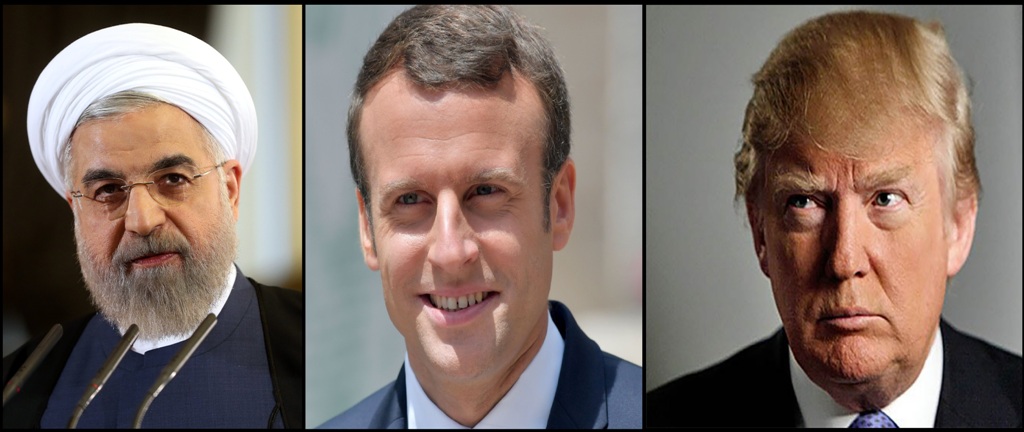
All three leaders were in New York for the UN General Assembly, as was Secretary of State Rex Tillerson, who conveyed the request to Macron, according to several administration and foreign officials. Iran’s response, later that afternoon, was an unequivocal no. The Iranians, the French reported, “don’t believe you’re serious” and thought it was some kind of trick, a senior administration official said, The Washington Post reported.
In his own UN speech the next day, Rouhani denounced the “ignorant” rhetoric of “rogue newcomers to the world of politics,” although he did not mention Trump by name.
Trump has long held a deep belief in his face-to-face negotiating skill. He has said he would be “honored” to meet with North Korean Leader Kim Jong-un “under the right circumstances.” He also declared it an “honor” to meet with Russian President Vladimir Putin at an international summit in July. He said recently that once he got quarreling Persian Gulf allies together with him in a room, their dispute would “quickly” end.
But there seems little room for negotiation on the issues that divide the United States and Iran. Trump has said he wants to rewrite or “terminate” the Iran nuclear agreement; Iran and other signatories have flatly refused. He has demanded that Iran cease its ballistic missile development, which Iran says it is legally entitled to carry out. He has accused Iran of being the world’s supporter of terrorism.
Before Tillerson’s request, Trump already had broached the general idea of using France as a go-between during a bilateral meeting with the French president the night before his UN speech, the senior administration official said. “You guys have good relations” with Iran, Trump told Macron, according to the official. “Could you use your relations” to ask if Tehran is willing, should “the Americans want to talk?” the official said Trump asked.
“Macron said sure, he would try to do that,” the official said.
Asked why Trump wanted to meet with Rouhani, the official said it was “in order to say, ‘Here’s all the mean stuff you do in the world, and we want you to stop. . . . If not, you should know we’re working on a strategy to get you to confront all of this.’ ”
The primary message, the official said, was that “the golden Obama-era window of rapprochement is over.” This official and others spoke only on the condition of anonymity to discuss the diplomatic exchanges.
Trump has accused former president Barack Obama of having been soft on Iran, allowing it to expand its influence in the Middle East and beyond. Most prominently, Trump has called the 2015 nuclear accord that the Obama administration negotiated, “the worst deal ever.”
Last month, responding to oversight provisions imposed by Congress, Trump refused to certify Iranian compliance with the deal. He has ordered lawmakers to come up with a proposal to rewrite the agreement and impose new sanctions, threatening otherwise to “terminate” US participation.
Word of the proposed Trump-Rouhani meeting first circulated Sunday, when Iranian Foreign Ministry spokesman Bahram Qasemi told reporters in Tehran that “indeed, a request was made by the American side, but it was not accepted by President Rouhani.”
In discussing the request, some officials described it as “vague” and indicated that it left open the question of whether Trump, Tillerson or some other senior official was on offer to speak with Rouhani.
White House press secretary Sarah Huckabee Sanders, queried by NBC News on Sunday about Qasemi’s statement, emailed that it was “false,” the network reported.
At Tuesday’s State Department briefing, spokeswoman Heather Nauert said of Qasemi's assertion, “I know that was something that the secretary had floated. . . . The Iranian officials said no, and that was the end of it.” Asked directly whether the Iranians had specifically turned down a meeting with Trump, Nauert said, “They did.”
Pressed further, however, she spoke only of a proposed meeting with “US officials,” before referring any additional questions to the White House.
Highlighting Iranian suspicions of US motives, Iran’s Leader Ayatollah Seyyed Ali Khamenei wrote in a tweet to Iranians on Wednesday, “My dear children, do not forget, in the important, conducive path toward ideals, your major enemy is the US.”
Source: Iran Daily
* Karen DeYoung is associate editor and senior national security correspondent for the Washington Post
9417**1377
Follow us on Twitter @IrnaEnglish
 solhkhabar | Peace International News Agency Peace International News Agency , Peace News , International Agency News of Peace
solhkhabar | Peace International News Agency Peace International News Agency , Peace News , International Agency News of Peace